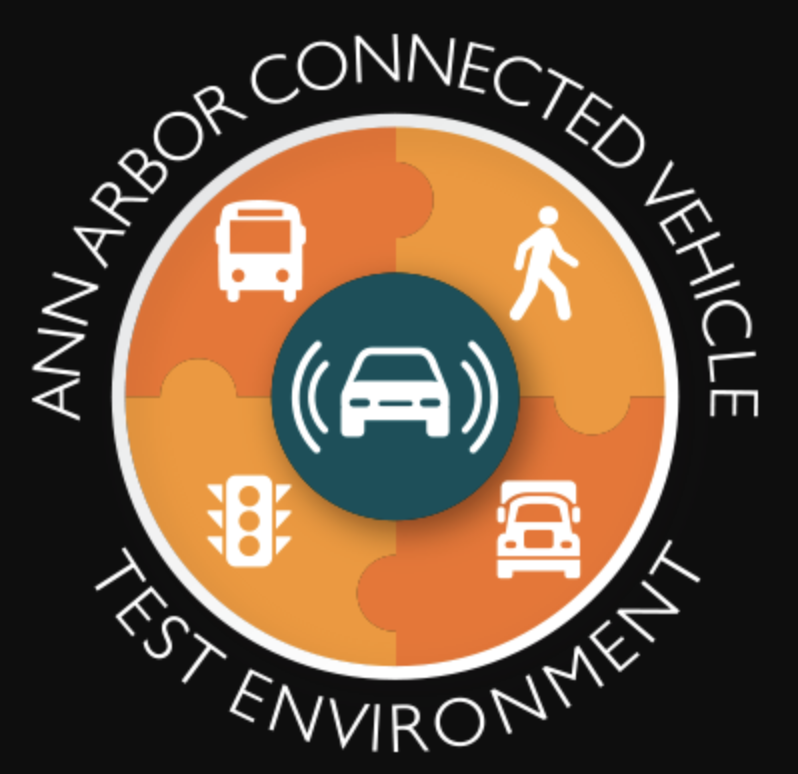
There’s a lot of excitement about autonomous vehicles — and rightly so! A world with self-driving cars is truly the stuff of sci-fi novels and childhood dreams, coming to fruition right before our eyes. While a lot of focus is on the marvels of autonomous vehicles, their ability to leverage connected technologies will ensure increased safety and reliability.

Ann Arbor is the largest operational, real-world connected vehicle and connected infrastructure test environment. The Ann Arbor Connected Vehicle Test Environment (AACTVE) project, spearheaded by the University of Michigan Transportation Research Institute (UMTRI), has equipped more than 2,600 vehicles with safety and awareness devices. The installed infrastructure includes 61 intersections, two curve speed warning sites, and four pedestrian mid-block crosswalks. Learn More
The Ann Arbor region has emerged as a hub of mobility innovation, carrying on southeast Michigan’s automotive pioneering spirit. With two testing grounds in the area — Mcity and the American Center for Mobility — both global powerhouses and startup companies are locating here to pursue their connected and autonomous vehicle (CAV) innovations.
While the ubiquity of autonomous vehicles may yet be a thing of the future, connected technologies are already being used to improve the safety for pedestrians, bicyclists, and drivers. Connected vehicles are those that communicate wirelessly with each other and with infrastructure. Two major benefits of this technology for the public are improved safety and reduced congestion. Companies and organizations in Ann Arbor, along with the city itself, are leading the way today while preparing for tomorrow.
Right-Turn Assist Live Demo with Derq and Kapsch
One of the greatest risks to a bicyclist is when a car makes a right turn without checking to see if there is a rider in the bike lane, and this risk is only compounded when other objects obstruct drivers’ view. Derq, whose North American headquarters is located at the Ann Arbor SPARK Central Innovation Center, uses AI to power a real-time predictive platform to eliminate these and other types of accidents, saving lives.
Derq recently partnered with Kapsch to conduct a live demo in Vienna to show how its edge-based platform, coupled with Kapsch’s V2X infrastructure, can help prevent crashes between cyclists and connected vehicles. Derq analyzes live feeds from roadside sensors to predict cyclist and vehicle intent. When there is a high risk of collision, Derq then sends warning alerts from the infrastructure to nearby connected vehicles far enough in advance that preventative action can be taken, making roadways safer for all.
Derq and Kapsch’s live demonstration of right-turn assist alerts to protect pedestrians and cyclists has never been done before, and the partners are actively exploring opportunities to deploy their solution at scale commercially. Derq’s U.S. patent for the concept, system design, and implementation was approved in early 2019.
Improving Human Interaction with Connected Vehicles
Within Ann Arbor’s emerging mobility hub, there’s a niche of companies using connected technologies and AI to improve pedestrian safety.

UK-based Humanising Autonomy is currently participating at TechLab at Mcity, an incubator for early-stage mobility companies in the connected and autonomous vehicle industry. Humanising Autonomy developed a pedestrian intent prediction platform intended to make autonomous vehicles safer and more efficient in urban environments. Ann Arbor SPARK helped connect the company to the Ann Arbor Area Transportation Authority. Humanising Autonomy is collaborating with Ann Arbor Area Transportation Authority to test bus driver alerts in an effort to help predict pedestrian, cyclists and vulnerable road user actions.

A participant in the spring 2019 Ann Arbor SPARK Entrepreneur Boot Camp and current tenant at Ann Arbor SPARK Central Innovation Center, Intvo is also advancing the ways connected vehicles can predict human behavior. Intvo is committed to growing their company in Ann Arbor. According to Assam Alzookery, Intvo CEO and founder, “Ann Arbor provides access to recent graduates and seasoned professionals in the engineering and artificial intelligence space that are crucial to our growth.” The startup recently received a $60,000 PlanetM Mobility grant to launch a pilot program in Ann Arbor. Intvo software will enable early detection of distracted behaviors and predict the intent of pedestrians for the vehicles equipped with dedicated short-range communications (DSRC) that are part of the AACTVE project.

Finally, !Important Safety, established in Montreal opened an Ann Arbor office in 2019 located at the SPARK Central Innovation Center. The startup is developing a free app that would allow direct communication with the vehicle to communicate the location of the pedestrian to help prevent collisions.
Implementing Safety Today and Tomorrow
As we move towards deploying autonomous vehicles in our public domain— it’s critical that we deploy supporting connected technologies in collaborative environments. Ann Arbor has emerged as just such a destination — one that is committed to supporting the technologies that will ultimately advance the safety, environmental friendliness, and accessibility of transportation.